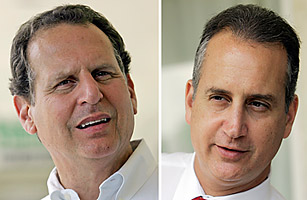
South Florida U.S. Reps. Lincoln, left, and Mario Diaz-Balart.
(2 of 3)
The Cuban-born Martinez, who trails Lincoln Diaz-Balart by an average of fewer than five points in polls but has kept the incumbent under 50%, is a shrewd but controversial choice to take on Miami's GOP machine. From 1981 to 2005, Martinez, 59, was the popular mayor of Hialeah, a Cuban exile enclave adjoining Miami that is the heart of the 21st district. Hialeah, despite re-electing the Democratic Martinez five times, usually votes about 80% GOP in national elections. But Martinez's claim that Lincoln Diaz-Balart, 54, "wants to be President of Cuba" more than he wants to tackle South Florida's problems has struck a chord. "We have to start paying attention to other concerns," says Martinez, who won the Miami Herald's endorsement, "like the fact that almost a quarter of Miamians have no health insurance."
Lincoln Diaz-Balart notes that he sponsored a pending federal health care benefits bill for legal immigrant children. "If I was only concerned about Cuba," he says, "I would have been voted out of office long before now." And he insists his foe "was a flawed candidate from the start" because of Martinez's 1991 conviction on racketeering and extortion charges. The convictions were overturned because of jury misconduct, and Martinez later won an acquittal.
Ironically, a Cuba issue has given Martinez and Garcia a big boost. In 2004, as a gift to exile hardliners, President Bush tightened restrictions on Cuban-Americans' travel to Cuba as well as on the amount of remittances they can send to relatives on the island. But polls show most Miami Cuban-Americans oppose the new rules, which the Diaz-Balarts and Ros-Lehtinen back, and the Democrats are reaping the fallout. "Bush and the Republicans turned the private urge to stay connected with family back in Cuba into a public sin," says Garcia, 45, a Miami political veteran who, like Martinez, opposes the travel rules. "It shows how out of time and touch they are with this community."
But Mario Diaz-Balart, like Lincoln, denies any schism in that voter bloc and he points to a Telemundo poll this month that shows him leading Garcia almost 2-to-1 among Cuban-Americans. "The Cuban-American community is as unified as ever behind us," insists Mario Diaz-Balart, 47. That survey, however, has him leading Garcia overall by only two points, 43% to 41%, largely because Garcia, who is also Cuban-American, is 13 points ahead of Mario Diaz-Balart among non-Cuban Latinos, whose numbers roughly equal that of Cubans in the 25th district. For his part, Martinez holds a 16-point lead among non-Cuban Latinos in the Telemundo poll.
The Miami GOP's most tried-and-true tactic—branding opponents as Castro-coddlers—has also hit a brick wall this year because Martinez and Garcia still back the embargo and are old hands at Castro-bashing themselves. When Garcia held an April fundraiser that included Democratic Congressman Charles Rangel of New York, an embargo opponent, Mario Diaz-Balart called it proof that Garcia "aligns himself with left-wing extremists" with a history of "appeasing our nation's enemies." Garcia, an ex-director of the once hardline Cuban-American National Foundation, hit back with an ad pointing out that Mario Diaz-Balart's campaign took $80,000 from U.S. firms whose foreign divisions do business with Cuba in apparent violation of the embargo.